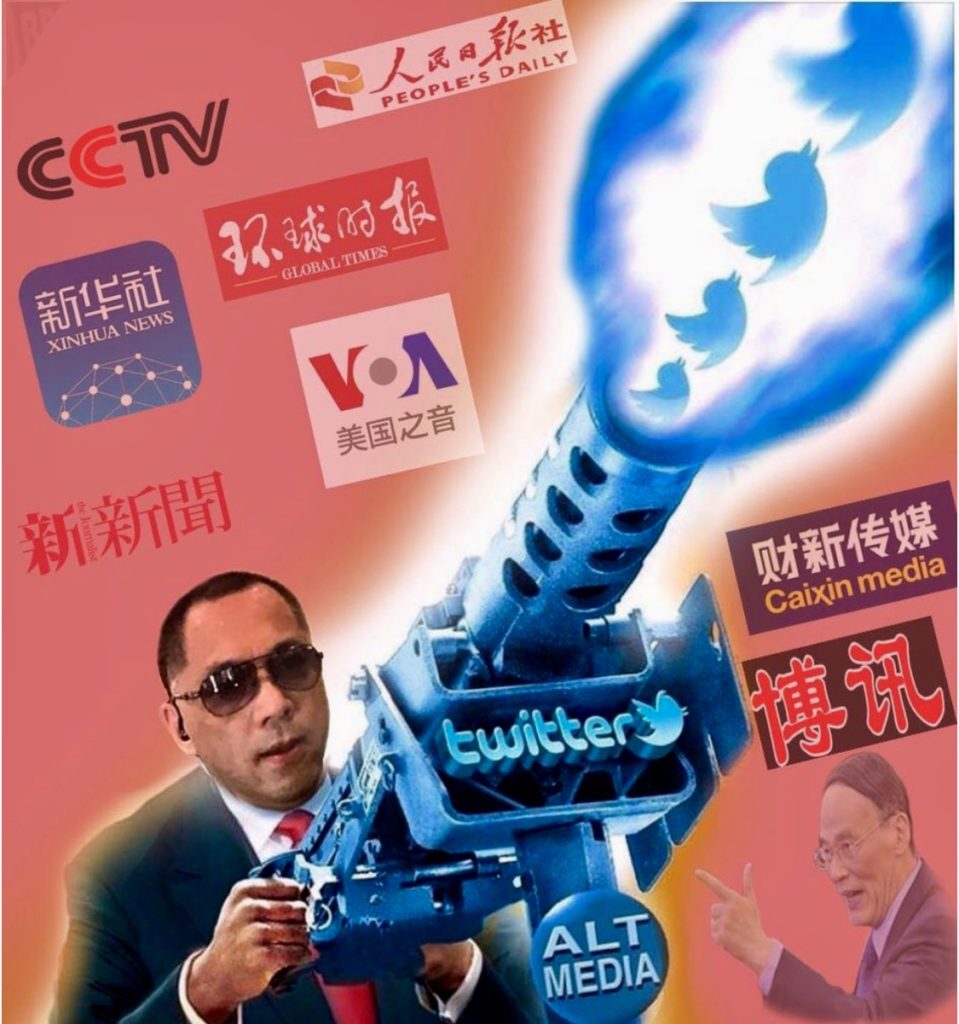BBG Watch Commentary
In what could be a plot of a surreal but all too true Franz Kafka or George Orwell novel, the management of U.S. taxpayer-funded Voice of America (VOA) international radio, TV and internet outlet interrogated one of its experienced and popular Mandarin Service TV anchors about wearing a white flower on the air.
The VOA Chinese TV host happened to wear a white flower while hosting a show shortly after the live interview with Chinese whistleblower billionaire businessman Guo Wengui, which aired on April 19, was ordered to be shortened by VOA director Amanda Bennett. While white flowers represent innocence in the American culture, in the Chinese culture they represent death and are often found at funerals, but not every white flower has such symbolism in China.
According to several VOA Mandarin Service journalists who want to remain anonymous because of the fear of reprisals from the management, the Human Resources (HR) personnel of VOA’s parent federal agency, the Broadcasting Board of Governors (BBG), used various techniques in an attempt to force the VOA Chinese TV program host and others into admitting that wearing a white flower was done on purpose to signify the alleged death of press freedom at VOA. Several days after shortening of the interview, Bennett placed five VOA Mandarin Service journalists, including its chief Dr. Sasha Gong, on administrative leave with pay. Gong reportedly argued against the order to limit the length and scope of the interview which she helped to arrange.
Agency officials were told by VOA Mandarin Service journalists that the TV anchor in question, who was not one of the suspended broadcasters, wears flowers of different colors when hosting her shows. For many Voice of America Mandarin Service journalists, this interrogation borders on absurdity, but the BBG and VOA management may be worried by the symbolism of white flowers after groups of Chinese Americans staged a mock funeral in early May in front of the Voice of American building in Washington, DC.
The Chinese American demonstrators placed two funeral wreaths made up largely of white flowers and carried a mock coffin to show that for them the Voice of America is dead in China as a result of what they believe was censorship and caving in to pressure from the Chinese communist government. The signs on the wreath in English and Chinese said “RIP [rest in peace] to VOA.”
Chinese Americans have also started a legal defense for five VOA Mandarin Service journalists involved with the Guo Wengui interview who were placed on administrative leave with pay and are being investigated by the BBG and VOA management. As of a few days ago, they have collected over $20,000 through many small donations.

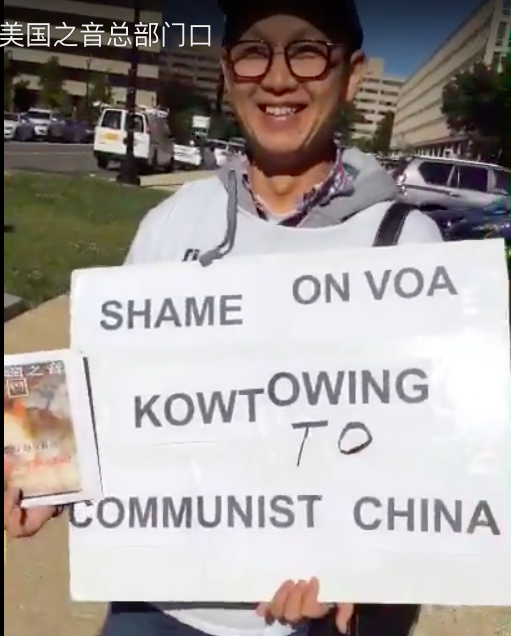
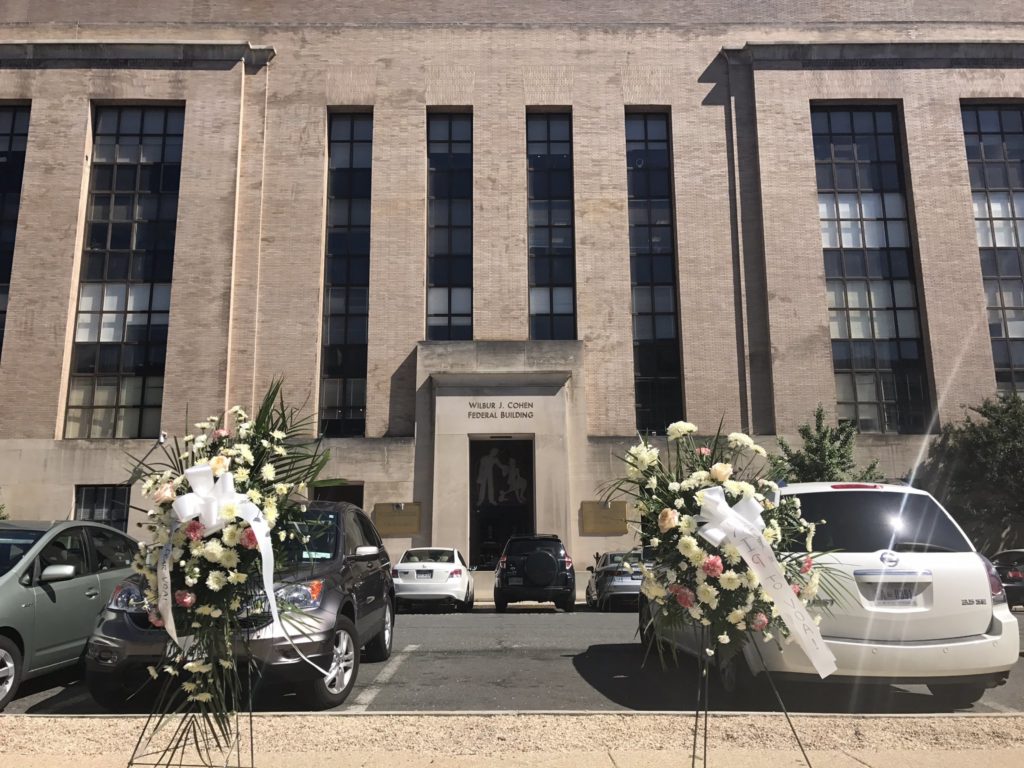
VOA director Amanda Bennett categorically denies that she or the Voice of America caved in to pressure from the Chinese government. She issued a statement that “at no time during this decision-making process was there any management consideration of not doing the interview, nor of cutting short an ongoing interview for any reason.” However, some senior VOA managers argued against doing a live interview even though Guo Wengui said that he would only agree to be interviewed live. It was reported that some of these senior managers reluctantly approved only a 15 minute live interview on condition that it would focus on Guo’s personal story and that he be not allowed to make allegations against other persons. VOA Mandarin Service journalists were reportedly told by Bennett and other senior managers that they could record the rest of the interview to be reviewed and broadcast later, but Guo would not agree to such an arrangement, apparently fearing that VOA might censor his answers if they were not broadcast live.
When Amanda Bennett ordered the live interview with Guo Wengui to be shortened, the VOA director, who is a Pulitzer Prize winning journalist and an Obama administration era appointee, seemed concerned that the Chinese government had not been given an advance opportunity to respond to his potential accusations of corruption within the Chinese Communist Party and influence buying in the United States. The Chinese government had threatened earlier taking unspecified actions against VOA if the announced three hour long combination live TV and live social media streaming program with Guo Wengui were to be broadcast. Before the Chinese threat, VOA management had approved expenditures for travel and technical support for the three hour live interview to be done in New York. It appears that senior managers intervened only after the Chinese government issued its warning.
Even before the interview was broadcast, Beijing responded by executing an international arrest warrant for Guo who now lives in the United States. This official Chinese response, however, was apparently not sufficient for the VOA director who said that by insisting on getting the Chinese government to respond in advance to allegations of corruption she was only concerned with protecting the universal standards of journalism. After the live interview was shortened to one hour and 19 minutes, but apparently not by as much as she wanted, Bennett launched an investigation of VOA Mandarin Service’s response to her orders and placed five VOA Chinese journalists on administrative leave with pay. Senior managers, including Bennett, who had failed to oversee properly the planning process and subsequently together with Bennett made the decision to shorten the interview, were not suspended, even though it was their decision that led to VOA’s loss of credibility in China.
Journalists in the VOA Mandarin Service told Bennett after the shortened program aired that the management’s decision to make the interview shorter than what was previously announced to the audience has caused an “unbelievable” public relations damage for VOA in China. Guo Wengui posted a meme on Twitter and Facebook showing the VOA logo lumped together with logo’s of China’s censored communist state media, such as the official Chinese Communist Party newspaper People’s Daily and Xinhua, the official press agency of the People’s Republic of China. The meme shows Guo Wengui attacking them with tweets coming out from what looks like a Twitter gun.
Thousands of comments posted by Chinese social media users after the shortened interview were also highly critical of VOA’s management, including Bennett. Some of the comments focusing on Bennett’s explanation of the incident were sarcastic in nature. In a letter to the Editor of the Wall Street Journal Bennett accused Dr. Sasha Gong, VOA Mandarin Service chief who had conducted the interview with Guo and is one of the five suspended journalists, of not agreeing with “universally accepted journalistic principles.” In another letter to the Editor of the Wall Street Journal, former VOA director Robert R. Reilly defended Dr. Gong and her VOA Mandarin Service colleagues.
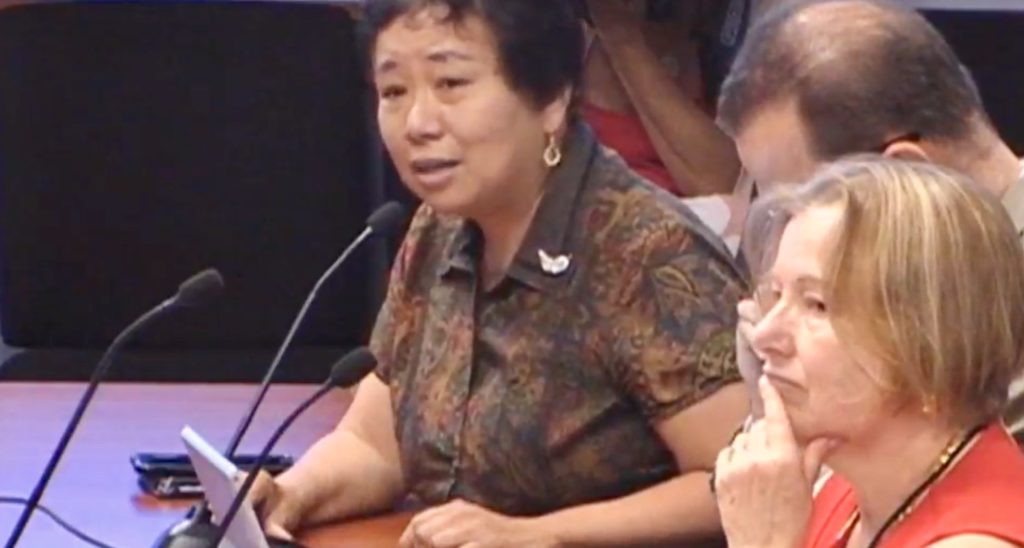
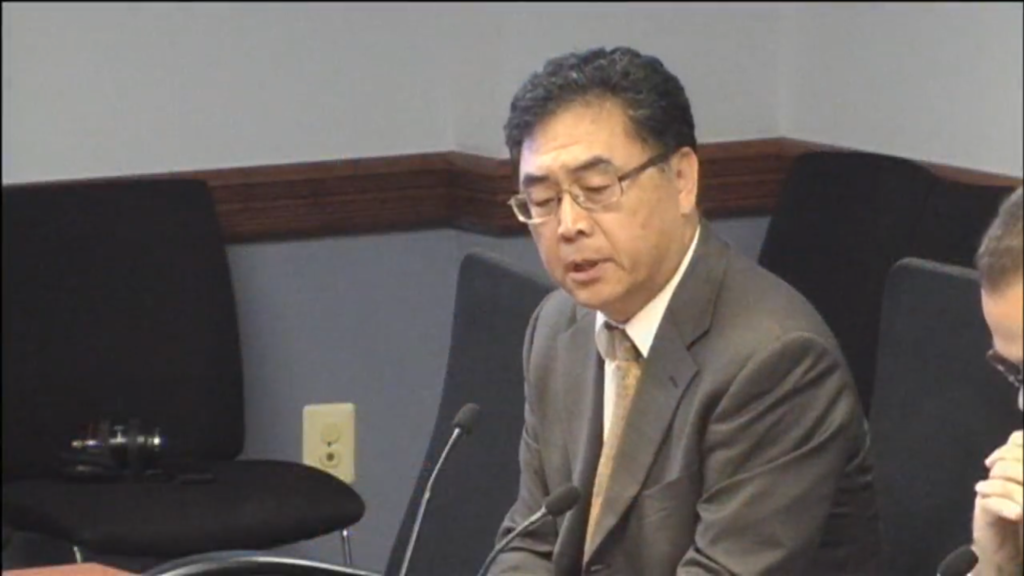
Sasha Gong wrote recently:
“Immigrants from China like us have experienced a great deal in our lives. We survived dictatorship, political persecution, and government violence. We appreciate liberty, and understand that we must keep fighting for it. If we don’t fight, the erosion of freedom will happen in the hands of the powerful. So, to many Chinese-Americans, our fight is their fight. We have their support.”
According to CNBC, “Voice of America Director Amanda Bennett denied that Beijing influenced VOA’s decision.”
“It was not caused by the Chinese involvement. It was caused by our own recognition at a news meeting that an unusual interview had been scheduled,” she told CNBC, arguing that Guo was making allegations that could not be verified. “It wasn’t miscommunication, and the instructions were clear.”
However, the intitial BBG statement to the press on the Guo Wengui interview referred to “miscommunication.”
“In a miscommunication, the stream was allowed to continue beyond the first hour. When this was noticed the feed was terminated.”
By now, the investigation of VOA Mandarin Service journalists may have cost U.S. taxpayers tens of thousands of dollars in salaries paid to employees who are not working and in fees to an outside law firm and an outside investigator hired by the management. It was subsequently discovered that one of the outside investigators whom Amanda Bennett praised in an interview with CNBC for his ethics and integrity has been doing private business in communist China. While Americans doing business in China are not violating any U.S. laws, the unanswered question is to what degree such business activities depend on the good will and approval of Chinese communist officials.
It is also not uncommon for members of the board overseeing the Broadcasting Board of Governors agency, including the Voice of America, to do corporate business in countries like communist China and Putin’s Russia. The Los Angeles Times reported in February 2016, that Jeff Shell, chairman of Universal Filmed Entertainment Group, announced the $450 million deal with China-based video game maker Perfect World which had agreed to invest in Universal Pictures’ movies. Shell was at the time Democratic chairman of the BBG Board and still remains a board member. One of the companies run by Amanda Bennett’s husband is also reported doing a multimillion dollar business in China. By not recusing herself from decisions about programs to China, Bennett obviously does not believe that her husband’s business in China has any impact on her U.S. government role as the VOA director or that it should raise any concerns. The independent NGO Committee for U.S. International Broadcasting (CUSIB-cusib.org), which supports U.S. media outreach to countries in which press is censored, is strongly opposed to any persons doing business in such countries, including Russia and China, having any role at the Broadcasting Board of Governors, the Voice of America, or any other BBG entities.
VOA Mandarin Service journalists who are still working told BBG Watch that four months after the abrupt cut-off of the live interview with Chinese billionaire turned whistleblower about such things as Chinese influence buying in the U.S., five senior VOA Mandarin Service journalists are still on administrative leave with no hope of returning to work in the immediate future. According to these journalists, the VOA management has “tightened its grip on the service, strangled journalistic independence and further deflated staff morale.” Amanda Bennett and the BBG and VOA management deny such accusations and reject any suggestions that they may be soft on China because of any political, personal or business reasons.
The dysfunctional agency, which Hillary Clinton described in 2013 as “practically defunct,” has lost its former relevance as an international media and opinion making outlet, which worries members of Congress. They have asked for an independent investigation of the VOA Guo Wengui incident and received a tentative agreement from U.S. Secretary of State Rex Tillerson that the Office of Inspector General (OIG) would look into any substantial charges. The internal BBG investigation has been compromised from the start. Current BBG CEO John F. Lansing, also an Obama administration era appointee, has given Amanda Bennett his full support. Neither Bennett nor Lansing had any prior experience in managing a federal bureaucracy. President Trump has not yet named anyone to replace Lansing.
Former VOA managers and employees don’t recall another instance before Lansing and Bennett came to the agency where five Voice of America journalists had been simultaneously suspended with or without pay in a labor-management programming dispute involving the VOA director. Lacking prior experience in government service, Lansing and Bennett have relied on the permanent government bureaucracy for advice. While described as amazing and excellent by Lansing, Bennett, former BBG chairman Jeff Shell and some other members of the BBG board, longtime BBG and VOA bureaucrats have been consistently putting the agency at the bottom of Office of Personnel Management (OPM) Federal Employee Viewpoint Surveys (FEVS) which measure employee morale, satisfaction, and employees’ view of the agency’s senior leaders. This time these failed managers found five experienced, dedicated and loyal VOA Chinese broadcasters and put them on administrative leave. When it comes to accountability for poor management and programming failures, these permanent BBG and VOA bureaucrats are experts in getting the finger pointed at anybody else but themselves.
Interrogating frontline Voice of American journalists about wearing a white flower while hosting a VOA television program to China is bound to sink employee morale even further. To outside observers, it shows that the agency has reached a state of chaos never before seen in its history. Fortunately, Radio Free Asia (RFA), which is part of the BBG agency but has a separate and effective management, continues to provide excellent and uncensored surrogate news and opinions to its Chinese audience. Unfortunately, RFA’s budget for future programming to China may be cut off in FY 2018. Congress should also investigate how these decisions to reduce funding for RFA programs to China were made and by whom.
